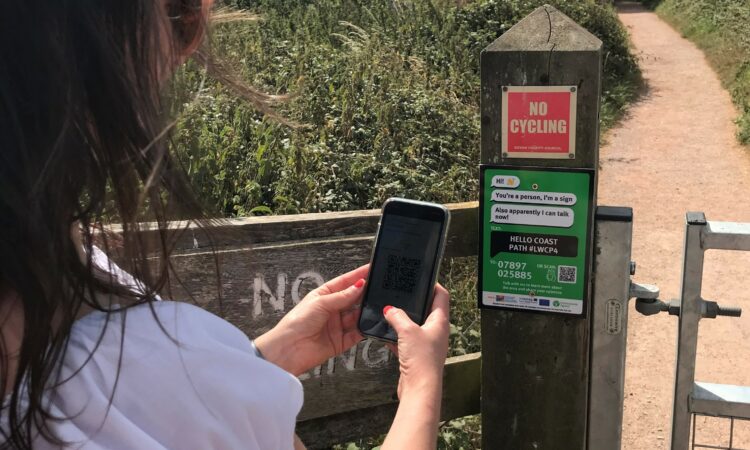
Visitors to the area of the Lower Otter Restoration Project (LORP) can now have a virtual conversation to find out more about what is happening with the scheme.
The project has launched a 12-month pilot with Hello Lamp Post, an innovative virtual platform used to engage people with their environment, to give residents and visitors to the LORP project site at Budleigh Salterton the opportunity to ask questions and find out more about the project using their mobile phone.
Hello Lamp Post allows people to have two-way “chats” with objects in their local environment. Residents and visitors will be able to find out why the LORP scheme is needed and what is happening around the site. They will also be able to give feedback on the project itself. Signs have been attached to benches and posts along the footpath between Lime Kiln car park in Budleigh Salterton and South Farm Road, close to the LORP site. Anyone with a mobile phone can scan the QR code or text the number on the sign to begin a conversation by text. Details are also available on the LORP website.
The first interactive locations are now live at the Lime Kiln car park, along the South West Coast Path, at the bird hide, on fingerposts, benches and viewing platform on the footpath and at the Kier Construction compound entrance in Granary Lane.
Mike Williams, project team member for the Environment Agency, the lead partner in the project, said:
“Community engagement has always been a key part of the Lower Otter Restoration Project. We’re always looking for new and better ways to talk to people, to find out what residents and visitors think of the work we’re doing and to let them know why we’re doing the work. Hello Lamp Post lets people reach us when they’re walking by the project site.”
The Environment Agency is working in partnership with landowner Clinton Devon Estates to deliver the £15m Lower Otter Restoration Project, which is due for completion next spring. A similar project is taking place in Quiberville, Normandy – the Basse Saâne 2050 scheme. Together, the two schemes form the €26m Promoting Adaptation to Changing Coasts (PACCo) project, funded by the Interreg France-Channel-England programme.






